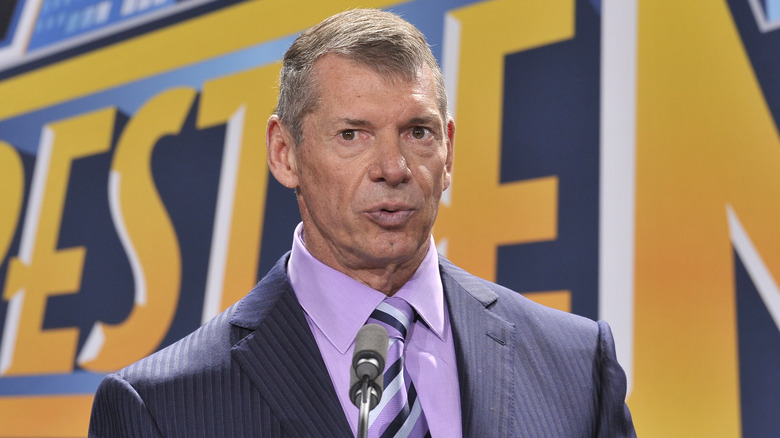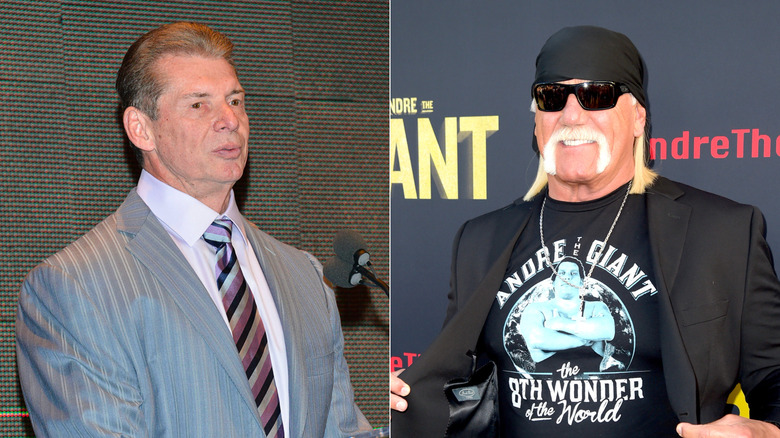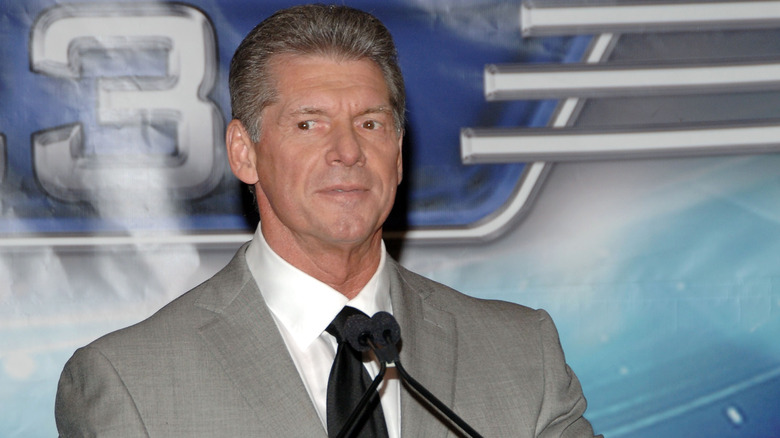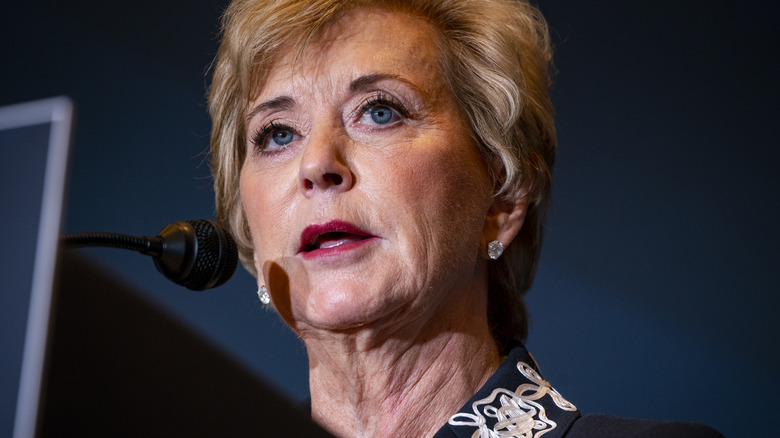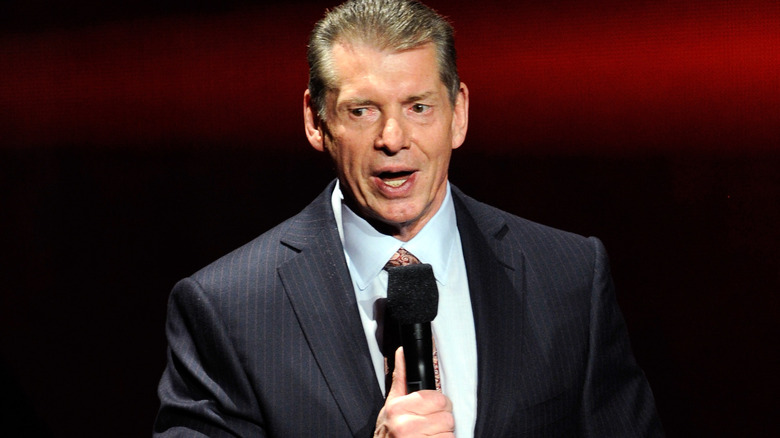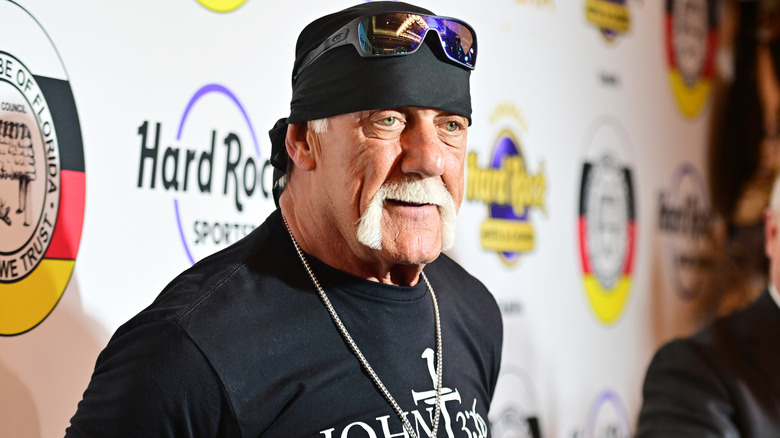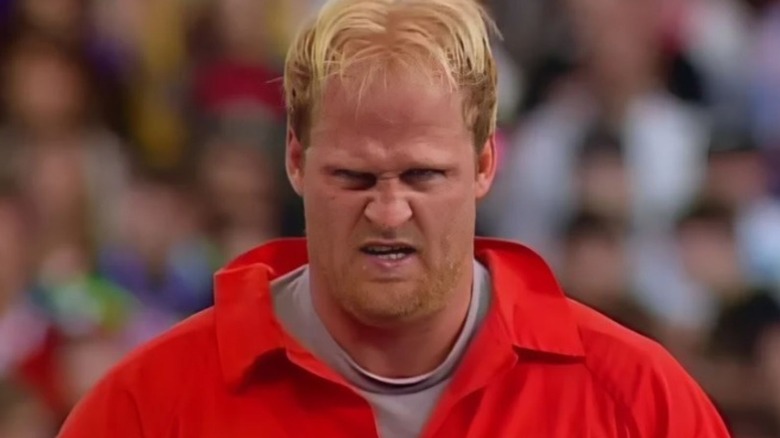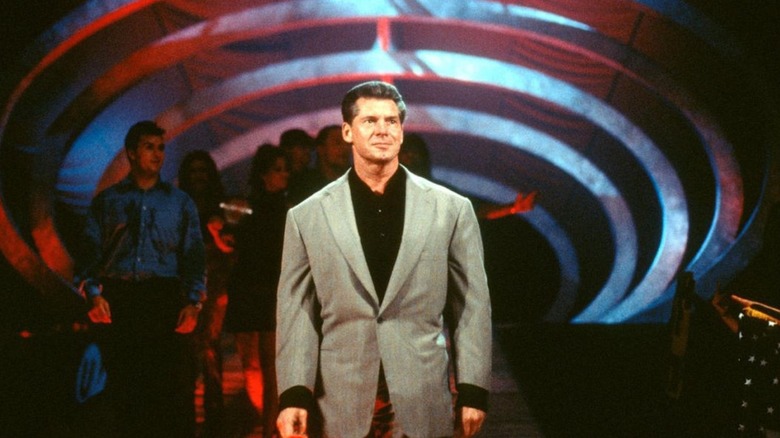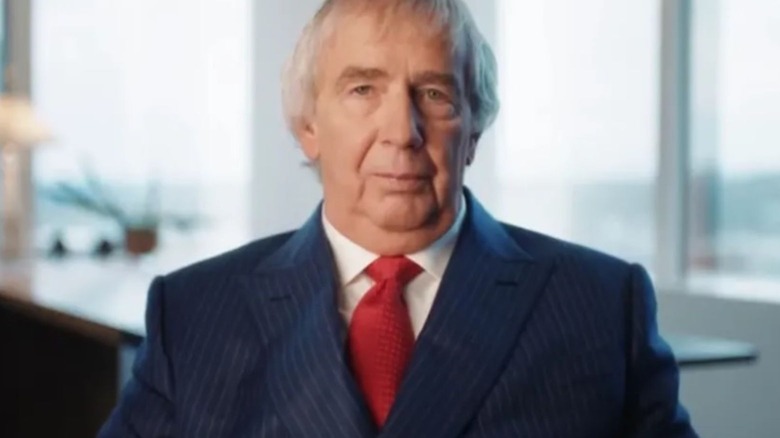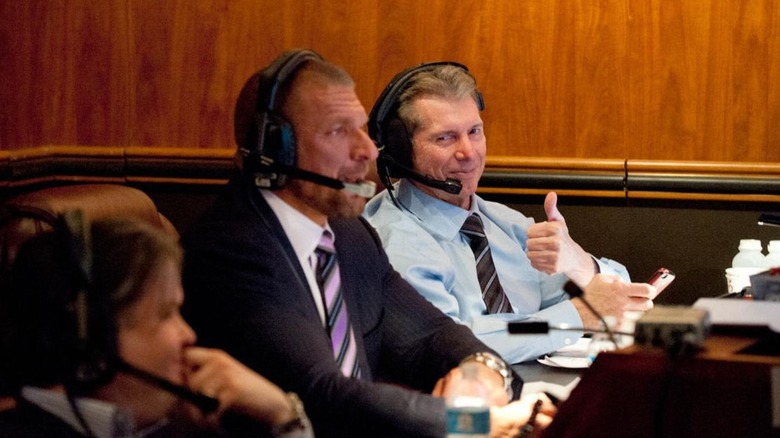The 1993 Steroid Scandal That Rattled WWE
The 1993 steroid trial of Vince McMahon almost completely changed the course of WWE, then known as the World Wrestling Federation (WWF), and the allegations almost put the then-chairman of the company behind bars and everything his family had created in jeopardy. The still-allegedly troubled McMahon was accused of providing his wrestlers anabolic steroids throughout the '80s and early '90s to achieve the superhero, comic-book-level physiques often seen in that era.
Anabolic steroids, often referred to as "gas" or "juice" were used by certain wrestlers throughout the era to achieve levels of muscle mass and larger-than-life appearances. At their core, steroids are used to help build muscle mass by acting like testosterone, helping build tissue. Steroid use has been banned in the U.S. since 1990. In WWF, a wellness policy was enacted in 1987 for recreational drugs after "Hacksaw" Jim Duggan and The Iron Sheik were arrested for drunk driving and cocaine possession, but the company was still not testing for steroid use.
The trial of McMahon actually began in 1994, but the events leading up to his almost-downfall are equally as important. Alleged steroid use in WWF began in 1984, when the company began working with a state-appointed ringside medic, a urologist from Hershey, Pennsylvania. Dr. George Zahorian began providing WWF stars with steroids for the next five years.
Who Was Dr. George Zahorian?
Zahorian, a still practicing urologist in Pennsylvania to this day, was convicted in 1991 of providing steroids to 37 WWF wrestlers, and 43 professional wrestlers overall. It was revealed he was providing the drugs to McMahon's office in Stamford, Connecticut. Zahorian's office was raided by federal agents in March 1990 prior to his trial, where Zahorian was allegedly found shredding documents. At the trial, "Superstar" Billy Graham testified he had bought large quantities of steroids from the doctor, before it became illegal to sell them, in the '70s and '80s.
Graham attributed his liver problems and sterility, among other issues, to steroid use. He testified he was addicted to steroids, citing depression when stopping a cycle as the reason why. "Rowdy" Roddy Piper, another admitted user of steroids, once wrote the town of Hershey, famous for its chocolate factory, "was one of the wrestlers' favorite vacation stops." At the time, it was revealed McMahon purchased steroids from Zahorian beginning in 1987, including to use for himself.
Hulk Hogan was set to testify against Zahorian, but WWF lawyer Jerry McDevitt was able to get the megastar out of appearing in court, and Hogan was initially listed as "John Doe" in court documents, to protect his identity. McDevitt said the two had a doctor-patient relationship, and Hogan consulted with Zahorian about other various medical issues, meaning testifying would "compromise his medical privacy rights." During Zahorian's trial, the U.S. attorney presiding over the case said the doctor's "lack of professional judgment with Graham was typical of his dealings with wrestlers." Zahorian was charged with 14 counts of illegally distributing steroids, as well as prescription painkillers. He was sentenced to three years in prison.
Charges: Explained
Steroids have been banned in the U.S. since the passing of the Anabolic Control Act of 1990. This means trafficking steroids is treated much in the same manner as trafficking a drug like cocaine. The act established penalties for people like coaches, advisers, or trainers who persuade others to use steroids.
According to Congress, the act also defined "anabolic steroid" as "any drug or hormonal substance that promotes muscle growth in a manner pharmacologically similar to testosterone, including specified substances." During the trial, McMahon said he himself had used steroids, but only before they became illegal.
After Zahorian's conviction, he cooperated with authorities, providing statements regarding giving steroids to the WWF and McMahon. McMahon was indicted in 1993, charged with possession of illegal steroids with intent to distribute, conspiring to distribute steroids, and embezzlement for allegedly using money from Titan Sports to purchase the drugs from Zahorian. McMahon initially faced six total charges, but three were thrown out before his time in court.
Linda McMahon Aware of Pending Investigation
As investigators in Pennsylvania were zeroing in on charging Zahorian, Linda McMahon sent a confidential memo to fellow executives within the company, saying that a criminal investigation could be headed Zahorian's way. The news of McMahon tipping off Zahorian did not come to light until 2010, during her Republican Senate campaign in Connecticut. McMahon reportedly learned of the investigation from a federal prosecutor, who tipped off a lawyer within WWF at a social event.
"Although you and I discussed before about continuing to have Zahorian at our events as the doctor on call, I think that is now not a good idea," McMahon wrote in the memo, dated December 1, 1989. "Vince agreed and would like for you to call Zahorian and to tell him not to come to any more of our events and also clue him in on any action that the Justice Department is thinking of taking."
Allegedly, according to federal prosecutors, an unnamed Titan Sports official, which reports state was Pat Patterson, called Zahorian and told him to destroy any evidence of his contact with the WWF. However, it's said Patterson wanted to continue working with Zahorian after the investigation.
United States v. McMahon
McMahon's case was heard in the United States District Court for the Eastern District of New York, not WWE's home in Connecticut, because prosecutors alleged the distribution of steroids happened in Long Island. The trial lasted 18 days. The prosecution alleged McMahon was in charge of distributing steroids to his wrestlers, requiring them to take the drug to increase their physique.
McMahon's lawyer said he only had a single discussion with Zahorian, regarding McMahon's concern over wrestler health. The charges could have led to a $1.5 million fine and up to 11 years in prison. McMahon's case still went to trial, despite drug testing for steroids within WWF beginning in 1991. The policy included a six-week suspension for the first failure, another suspension and mandatory rehabilitation for the second failure, and termination for the third.
Judge Jacob Mishler presided over the case. The legal team representing McMahon did not enter a defense, despite mentioning the only conversation McMahon and Zahorian allegedly had. During the trial, the judge dismissed the charges of distribution, ruling the prosecution did not provide enough evidence that occurred within the court's jurisdiction. After 16 hours of deliberation, McMahon's "not guilty" verdict was announced on July 23, 1994.
Key Witnesses
Throughout the trial, testimony was provided by key witnesses, including various WWF wrestlers, such as Hulk Hogan. Hogan testified, under immunity from prosecution, he regularly picked up steroids at WWE headquarters after calling McMahon's secretary, but also said he was never directed by anyone, including McMahon, within the company. Hogan said that the drugs were provided to him amongst things like fanmail and paychecks, but he initially had taken steroids prescribed to him for medical issues. He testified that while not directed to take them, he did share steroids with McMahon during the '80s. Hogan said he had been taking the drugs for 14 years, but has never specified publicly when he stopped.
Rick Rude, Tully Blanchard, The Warlord, and Ultimate Warrior were among others who took the stand. On "Dark Side of the Ring" in 2021, when asked if Warlord knew who the doctor was, he smirked and replied "oh yeah." He said Zahorian would always have a "big doctor bag" by his side, which would be full of steroids. He asked the wrestlers if there was anything they would like while treating them.
"The best thing I did was just tell the truth. Vince never came to me, face to face, and said, 'Terry, if you don't take steroids, you don't have a job,'" Warlord said. He also claimed the steroid trial was a "witch hunt."
Nailz In The Coffin
Only one person said McMahon made him take steroids. Kevin Wacholz, known as "Nailz" in the ring, who had been released by the company in 1992 after a backstage confrontation with McMahon, testified McMahon urged him to take steroids to "make him bigger." "I strongly suggest you go on the gas," McMahon allegedly told his now-former employee.
Ultimately, Wacholtz's testimony was questioned, due to his previous issues with McMahon, though he said he had no animosity toward his former boss. "Nailz" also said he was forced to testify in the trial by the Department of Justice and the federal government, but did not want to have anything to do with the company or McMahon following his release.
In 2023, Wacholz recounted having to testify in the trial. He said he told investigators to "get lost" before getting a call from the Department of Justice. Wacholz said he still refused and one day, his house was surrounded by federal agents when he came home from work. He recounted he was paid for his testimony during the trial, saying he was told he'd be paid what he wanted.
New Policies in WWE
"I'm elated. Just like in wrestling, in the end the good guys always win," said McMahon following the trial. After being victorious in court, McMahon went on to be one of the key characters in WWF's Attitude Era and remained in power. After the trial, McMahon decided to move the company's drug testing policy to an entity outside of WWE. However, WWE did not introduce its "Wellness Policy" until after the 2005 death of Eddie Guerrero, who passed at age 38 due to heart failure. Steroid and drug use contributed to Guerrero's death. Randon drug testing is part of the policy, and wrestlers are tested for steroids and illicit drugs, as well as prescription drugs. WWE lists its wellness policy publicly online on its corporate website, and is constantly amending it, including banning muscle relaxers in 2010.
In today's policy, WWE defines "non-medical use" as "use of a drug by a WWE Talent for other than a legitimate medical purpose given pursuant to a valid prescription from a licensed and treating physician." A doctor in Nashville, Tennessee is responsible for scheduling stars for testing. A doctor in Pittsburgh, Pennsylvania would be responsible for investigating a positive test, should a talent have one.
When asked to be subject to a random drug test, a talent has to provide a urine sample within two hours of the request, or risk being accused of refusal to test. The policy even describes alcohol use for WWE stars, and talent are expected to be alcohol-free, not just while performing in the ring, but within a 12-hour period to any WWE event. The first violation of WWE's Wellness Policy is a 30-day suspension, and the second is a 60-day suspension. WWE outlines that the third policy violation, other than for marijuana or alcohol, will result in termination.
Media Coverage Post-Trial
The steroid trial was featured on an episode of "Dark Side of the Ring" in 2021. The episode, in part, centers around lawyer Jerry McDevitt, who has represented WWE for around 30 years, including throughout the steroid trial, and a figure those following the trial may not have known about. Former commentator for the company, Jim Ross, called McDevitt "one of the smartest men he's ever met" and "the best money could buy." On "Dark Side of the Ring," McDevitt called his relationship with McMahon "unbreakable." Following the steroid trial, the lawyer went on to represent WWE throughout the Chris Benoit murder-suicide scandal, as well as Owen Hart's death.
In the episode, the lawyer said there was a lot of "hysteria" about steroids back in the day. McDevitt was present at WWF headquarters when they received the first grand jury subpoenas that kicked off the investigation. McDevitt said he felt like it was a "witch hunt." The episode goes on to recount the trial itself, and at the end, The Wrestling Observer's Dave Meltzer pointed out that the testimony in the case proved what everyone assumed, "that all of the wrestlers were on steroids."
The fallout and interest in the trial and McMahon's acquittal continues to be a subject of conversation to this day. It's been revealed WWE has teamed with Blumhouse Television to develop a new, scripted TV series called "The United States of America vs. Vince McMahon." McMahon will serve as an executive producer on the show, alongside Kevin Dunn, former WWE Executive Producer and Chief of Global Television Distribution.
McMahon Issues Ongoing
This was not McMahon's only scandal throughout his decades-long career, however. In 2023, the then-Executive Chairman was served with a search warrant and federal grand jury subpoena after allegedly paying off a number of women to keep them quiet regarding sexual misconduct in 2022, according to a Wall Street Journal report. McMahon faced trouble throughout the years, even prior to that, however.
Prior even to the steroid trial, McMahon was accused of ignoring "rampant" sexual misconduct within the WWF in 1992. Also in 1992, former referee Rita Chatterton alleged McMahon had raped her in a limousine in 1986, and provided a detailed account of the event on television. McMahon also allegedly played a role in Jimmy Snuka evading domestic violence and, potentially murder charges, in the 1983 death of his girlfriend, Nancy Argentino.
Following WWE's 2023 merger with UFC to create TKO Group Holdings, McMahon's role within the company was diminished. On January 25, 2024 WWE, Vince McMahon and John Laurinaitis were served a lawsuit from Janel Grant, a former employee that alleged physical and emotional abuse, sexual assault and trafficking at the WWE. The next day Vince McMahon officially resigned as Executive Chairman and board member of TKO.
